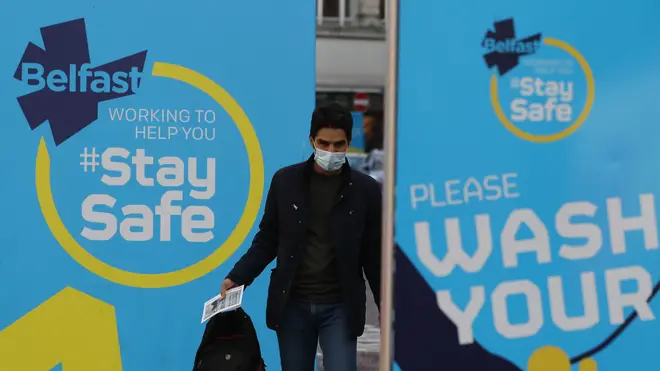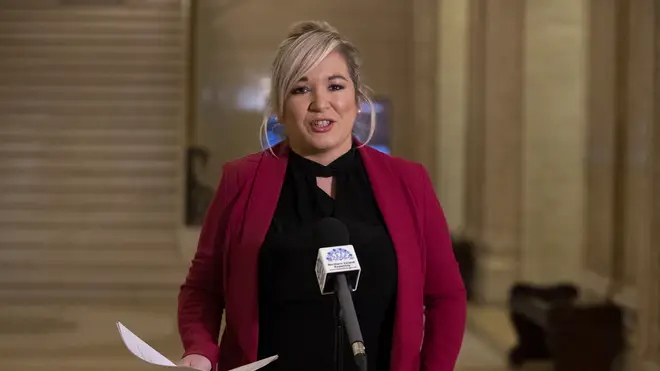
Vanessa Feltz 3pm - 6pm
17 December 2020, 19:08 | Updated: 17 December 2020, 20:41

Northern Ireland will enter a six-week lockdown beginning on Boxing Day to prevent its health service being "completely crushed" in January.
Ministers in the Northern Ireland Executive met for several hours on Thursday afternoon and into the evening to discuss their response to the ongoing coronavirus outbreak in the region.
They agreed that tougher measures will come into effect on 26 December, including the closure of all non-essential retail as well as close-contact services.
The already hard-hit hospitality sector will once again be confined to takeaway services only, while off licences will be forced to shut their doors at 8pm.
There will be no changes made to the Christmas bubbling arrangements, plus hotels can stay open until 28 December 28 to accommodate festive bookings, and the measures will be reviewed after four weeks.
Read more: Hospitals in Wales near full capacity with 10 critical care beds left
Explained: Christmas rules for England, Wales, Scotland and Northern Ireland

Michelle O’Neill at beginning of pandemic calling for Northern Irish schools to close
Deputy First Minister Michelle O'Neill described the situation in the region as "quite dire".
"It's very clear from the positive cases we're seeing every day that an urgent intervention was required," she said.
"The Executive had detailed discussion about what that needed to be: around the duration of that and the specifics.
"What has been decided today is that there's going to be a six-week lockdown that begins on December 26. That will stay in place for a period of six weeks."
She added: "There will also be financial supports put in place, so the current measures which we have had over previous restrictions will be rolled over to support businesses through this very challenging time."
The deputy first minister said Northern Ireland is in a "worse position" that it has been throughout the pandemic.
"I think the health service would be completely crushed in January if we didn't intervene now.
"Whilst this is draconian in many ways, it's necessary, and this is about saving lives, this is about saving the health service and this is about taking some pressure off the health care staff," she told reporters at Stormont.

Case numbers continue to rise in Northern Ireland despite the latest two-week circuit-breaker.
Health chiefs have cited low compliance with the regulations as a reason infections, hospital admissions and death rates remain relatively high.
Hospitals across the region are running over capacity, while the Northern Ireland Ambulance Service announced on Thursday that paramedics from the Irish Republic are set to bolster their numbers this weekend.
Michael Bloomfield, chief executive of the Northern Ireland Ambulance Service (NIAS), said the move is "relatively unusual" and reflects the pressure they are under.
On Tuesday, queues of ambulances were witnessed at accident and emergency departments (EDs) across Northern Ireland as patients were treated in car parks due to a lack of capacity inside the hospitals.
Read more: More areas of England plunged into Tier 3 due to rising cases
Read more: UK and EU agree deal ‘in principle’ on Northern Ireland protocol

Home Secretary: Clear guidance is in place covering Covid Christmas rules
At one point 17 ambulances containing patients were lined up outside the ED at Antrim Area Hospital.
Ahead of Thursday's executive meeting, economy minister Diane Dodds said Northern Ireland was in an "extremely challenging position" in terms of the virus's transmission.
"I have said over and over again how difficult this cycle of lockdown is for the economy, we have published data on the cost of the cycle of lockdown to the economy, but we'll wait and see what the discussion at the executive brings forward," she said.
On Thursday, the Department of Health's dashboard revealed a further 12 people with Covid-19 had died in Northern Ireland, bringing the region's death toll to 1,154.
Another 656 new cases of the virus were reported, while figures indicated pressure remained high on hospitals with 460 Covid-19 positive patients, including 32 in intensive care, and the hospital occupancy rate stood at 104 per cent.
Listen & subscribe: Global Player | Apple Podcasts | Google Podcasts | Spotify